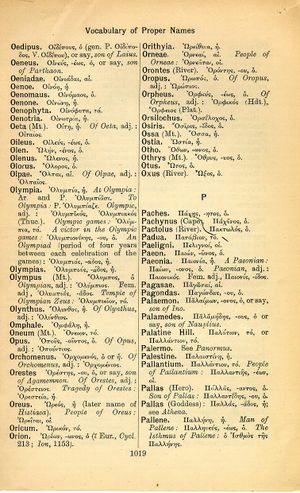Orpheus
ἐν τῷ ῥά σφι κύκησε γυνὴ εἰκυῖα θεῆισιν οἴνῳ Πραμνείῳ, ἐπὶ δ' αἴγειον κνῆ τυρόν κνήστι χαλκείῃ, ἐπὶ δ' ἄλφιτα λευκὰ πάλυνε. → In it the woman, like the goddesses, mixed Pramnian wine for them, and over it she grated goat cheese with a bronze grater, and sprinkled white barley on it.
English > Greek (Woodhouse)
Ὀρφεύς, -έως, ὁ.
Of Orpheus, adj.: Ὀρφικός (Hdt.), Ὄρφειος (Plat.).
Latin > English (Lewis & Short)
Orpheus: (dissyl.), i (Gr. dat. Orphei, Verg. E. 4, 57; Gr. acc. Orphĕă, Verg. E. 6, 30; Ov. P. 3, 3, 41:
I Orphēā, id. M. 10, 3; voc. Orpheu, Verg. G. 4, 494; Ov. M. 11, 44), m., = Ὀρφεύς, the famous mythic singer of Thrace, son of Œagrus and Calliope, and husband of Eurydice; after her death he led her back from the Lower World, but lost her on turning to look at her, breaking his promise to Pluto. He was one of the Argonauts, Hor. C. 1, 12, 8; Ov. M. 10, 3 sq.; 11, 5 sq.; Hyg. Fab. 164; 251; Verg. E. 4, 55; Cic. N. D. 1, 38, 107 et saep.—Hence,
A Or-phēus, a, um, adj., = Ὀρφεῖος, of or belonging to Orpheus, Orphean (poet.): vox, Ov. M. 10, 3: lyra, Prop. 1, 3, 42.—
B Or-phĭcus, a, um, adj., = Ὀρφικός, of or belonging to Orpheus, Orphic (class.): carmen, Cic. N. D. 1, 38, 107: sacra Orphica, id. 3, 23, 58: versus, Macr. S. 1, 18, 17.—
C Orphăĭcus, a, um, adj., = Ὀρφαικός, Orphic.—In plur. subst.: Orphăĭci, ōrum, m., the Orphics, the followers of Orpheus, Macr. Somn. Scip. 1, 12.
Latin > French (Gaffiot 2016)
Orpheūs,¹¹ ĕī ou ĕos, m. (Ὀρφεύς), Orphée [fils de la Muse Calliope, célèbre joueur de lyre, époux d’Eurydice : Cic. Nat. 1, 107

